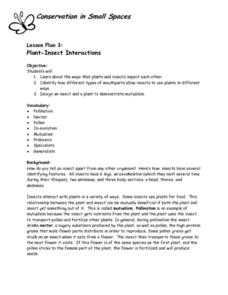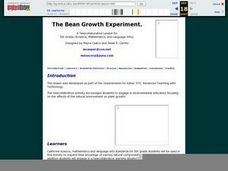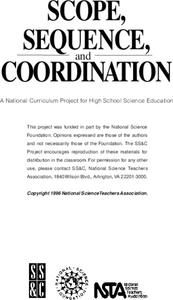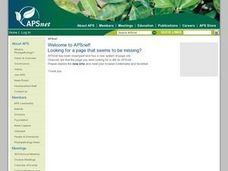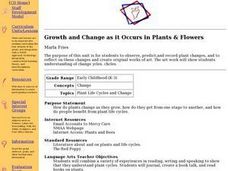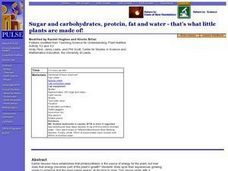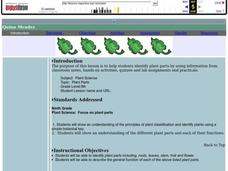Curated OER
What Parts Are There to a Plant?
Students explore botany by completing plant science worksheets. In this plant anatomy lesson, students examine real vegetables in class using magnifying glasses. Students identify the plants anatomy and complete worksheets discussing...
Curated OER
Urbanization and Native Hawaiian Plants
Fourth graders research plants native to the Hawaiian Islands. Using the plants, they identify its purpose in the watershed and ways to help protect them from extinction. They survey a area of land and discover ways in which to bring...
Curated OER
Plants Vocabulary Quiz
In this plant vocabulary worksheet, students draw lines to match 10 plant words with their meanings. Prior knowledge is assumed.
Curated OER
Plants
Student identify the characteristics of plants. Through hands-on demonstration, they create a model of plant parts. Students differentiate between the major divisions of the plant kingdom with a particular emphasis on the vascular and...
Curated OER
Plants Letter Shapes
In this plant worksheet, students write plant vocabulary words into word shapes after reading their definitions. Students write 8 plant vocabulary words.
Curated OER
Plants Quick Vocabulary Review Worksheet
In this plants activity, learners write the plant vocabulary word that is described by the given definition. Students write the words for 15 plant definitions.
Curated OER
Conservation in Small Spaces: Plant-Insect Interactions
Students explore ways that plants and insects impact each other, identify how different types of mouthparts allow insects to use plants in different ways, and design an insect and a plant to demonstrate mutualism.
Curated OER
Sensational Seaweed
Students compare kelp and land plants. In this sea plant lesson, students look at the role of algae in aquatic environments. They research the properties of kelp and explore seaweed.
Curated OER
Habitat Assessment
Third graders demonstrate the effects of varying environmental components on plants and animals: chemical, physical and biological characteristics of a habitat. They find chemical, physical and biological characteristics of the lake at...
Curated OER
The Bean Growth Experiment
Fifth graders use modern technologies which allow them to gain a new, dynamic, and intersting understanding of themselves, their community, and the world. They focus on environmental education and the effect of the environment on plant...
Curated OER
Creating My Own Rube Goldberg Machine
Students dissect simple machines. In this simple machines lesson, students gather simple machines from their home to dissect in class. Students investigate the working parts of simple machines and construct a machine based on the designs...
Curated OER
Summer Body Activity: As Big as Me!
Students explore things that are their size, literally. In this early childhood lesson plan, students use their bodies for measuring and comparing sizes as they work in pairs to complete the activity.
Curated OER
Learning About Trees
After looking at pictures of trees, discussing tree growth, and identifying the parts of a tree, lead your class on a nature walk and have them collect samples and record their observations. They then work in pairs to polish the...
Curated OER
Classification Schemes
Junior biologists journey through the hiearchy of living things with these activites. Using a dichotomous key, they identify common algae, plants, and fish. They design their own key for a mixture of seeds and a collection of...
Curated OER
Flowers and Their Life Cycles
First-time florists will be able to label the structures of simple and composite flowers after reading this handout and answering the comprehension questions. There are a couple of grammatical errors in the text, but the content is...
Curated OER
Plant Parts and Their Diseases
High schoolers see how certain plants are very important to us. They explain that healthy plants are important to keep people healthy. They study the major parts of a plant (root, stems, leaves, flowers, fruit and seeds) and their basic...
Curated OER
Growth and Change as it Occurs in Plants and Flowers
Students work together to observe plants and flowers through their life cycle. In groups, they make predictions and record changes in a journal. Using this information, they create their own original artwork and discuss the plants life...
Curated OER
Life Cycle of Brassica Plants: Planting Seeds
Students explore botany by participating in a calendar class activity. In this plant observation lesson, students examine a diagram of a Brassica plant and identify its anatomy before planting their own seeds and viewing the changes over...
Curated OER
Flowering Plants
Pupils conduct online research to investigate gardening and landscaping tips. They determine how they can help beautify their homes and neighborhoods.
Curated OER
Characteristics of Plants
In this characteristics of plants activity, students conduct an experiment on how a vascular plant moves nutrients to all its parts. They describe the difference between the celery leaf from sugar water and plain water. Students also...
Curated OER
Plant Parts and Functions
Fifth graders examine two or three unfamiliar flowers or fruits, such as eggplant and mango and realize that each flower or fruit comes from a flowering seed plant. They then identify the plants.
Curated OER
TRANSPIRATION IN PLANTS
Students define the hydrologic cycle, define transpiration, name the three parts of the hydrologic cycle, and record the amount of moisture given off by several green plants.
Curated OER
Sugar and carbohydrates, protein, fat and water - that's what little plants are made of!
Students identify photosynthesis as the mechanism by which plants convert sunlight energy into a usable energy source for plant processes. They identify photosynthesis as the mechanism by which plants create a molecule that can be used...
Curated OER
Plant Parts
Ninth graders identify plant parts by using different classification methods. In this plant lesson students observe and draw different types of leaves then classify them according to species.






